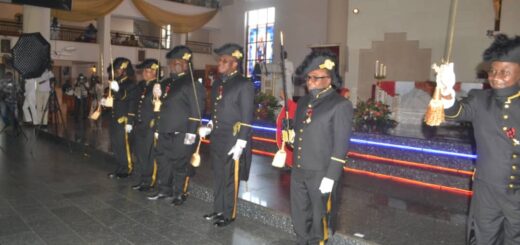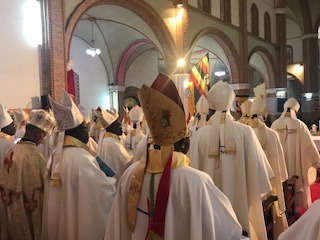The Journey of Lent and the Wilderness Experience
by ARCH BISHOP · February 18, 2024
First Sunday of Lent (CBCN 1st Plenary), 18.2.2024, Catholic Secretariat of Nigeria, Abuja. Homily by Most Rev. Ignatius A. Kaigama, Archbishop of Abuja.
Readings: Gen. 9:8-15; 1 Pt. 3:18-22; Mk. 1:12-15
The Journey of Lent and the Wilderness Experience
It is always a blessing for us in Abuja to receive all the Catholic Bishops of Nigeria assembled for their conference. I warmly welcome you my brother Bishops, just as I welcome you too dear brothers and sisters and distinguished invited guests not only to Abuja, but also to the Mass of the first Sunday of the Lenten Season.
Lent gives us an opportunity for a fresh start with God, since we say that life is a series of beginnings. The symbolism of ashes on Ash Wednesday reminds us that this world is not our home and so, we must change from our sinful situation, because sin is the “leprosy” of the soul, which disfigures it and truly makes us “unclean.”
Lent draws our attention to true religion which goes beyond mere prayers and fasting but as James 1:27 teaches, pure religion should lead us to concretely support the orphans, widows, Internally Displaced Persons, unemployed youths and many others in their affliction and to keep oneself unstained by the world.
In today’s gospel passage, St. Mark narrates that Jesus is baptized in the Jordan River and after fasting for forty days and forty nights in the desert, He is tempted by the devil. The first temptation was about disordering our relationship with ourselves, using what God has given us egocentrically for our own purposes rather than for the common good. This is shown in the temptation the devil gave to Jesus to change stones into bread. But Jesus replied that we live not on bread alone but on every word that comes from God’s mouth. We learn from this that we are to use our talents not selfishly but for God, society and for ourselves. The abundant talents Nigeria has in addition to the abundant natural resources should catapult her to the ranks of “first world” nations, but we seem to remain like a giant that is confused and crippled, unable to manage our resources, thereby, plunging people into poverty, frustration and criminality.
The second was to disorder His relationship with God, indicated by the temptation to throw Himself off the parapet of the temple presuming that God would save Him by sending His Angels to prevent His even dashing His foot against a stone. The devil seeks to tempt us to commit spiritual suicide; to get us to jump off various cliffs and then blame God for letting us suffer. Jesus teaches us to throw ourselves into His arms rather than from dangerous precipices into the devil’s arms.
The third temptation was about disordering relationships with others. The devil promised that he would give Jesus rule over all the cities, to be in control over everyone else, if only He would fall before the devil in homage. Jesus resisted by quoting Scripture about worshipping and serving the Lord our God alone.
The same Holy Spirit who drove Jesus into the desert wants to drive us into the desert to focus on our relationship with God and others and on who we are. To go into the desert is increasingly difficult, difficult to remove ourselves from distractions of the television, computer, radio, newspaper, to listen to God. People get totally lost, restless and apprehensive when they are out of mobile phone network range. Some of us think that our Lent can be complete if, for example, all we do is give up alcohol or meat, or pounded yam with edikaikong or ofe nsala. Lent urges us: “Be still and know that I am God” (Ps 46:10).
As Jesus found Himself in the wilderness with the wild beasts but the Angels were ministering to Him, we too can find ourselves caught between modern day “wild beasts” and angels. We find ourselves amid many wonderful, honest, God-fearing and truly patriotic countrymen who are giving their best to make Nigeria a better place. But we find ourselves also threatened by counter forces of armed robbers, kidnappers, terrorists, bandits, fraudsters and now hoarders, economic manipulators and currency speculators who are determined to make our lives a living hell on account of their crave for immoral profit. On top of what is already a bad situation, hunger, poverty and inflation seem to have conspired to bring death so near to our doorsteps.
There may be “wild beasts” out there that seek to undermine our faith and to weaken our national cohesion and progress, but as Noah chose to remain faithful to God’s commandments, and was delivered through the ark, God is always with us, guiding and protecting us even through the security and economic storms our country is passing through right now.
The Divine Physician does not only prescribe prayer, almsgiving and fasting. He also calls us to walk together in synodality which is part of the theme for our conference. Synodality has its roots in the early Christian community, but Pope Francis, however, has given it prominence in his bid to emphasize the importance of listening to the Holy Spirit and to the voices of all segments of the faithful in decision making in the Church, where decisions are made collectively, and the community’s well-being takes precedence over individual interests; where dialogue is promoted, and active participation encouraged. No matter what some people might think, synodality is not about changing the traditional rudiments of Catholic faith and practice or legitimizing the ill effects of secularism. Synodality resonates with our African culture because we always do things together as a family and we consult the members of the family to take collective decisions, based on the African principle that “I am because we are.” We have a duty to listen to the rest of the universal church, just as our African culture, ethics and morality have much to offer to our universal family, the Church.
The opposite of synodality is clericalism which Pope Francis calls a “scandal.” He said in a speech during the final week of the October 2023 synod that “clericalism is a thorn. It is a scourge. It is a form of worldliness that defiles and damages the face of the Lord’s bride…. It enslaves the holy, faithful people of God.” To be a synodal church means every Catholic is to be in communion with the other Catholics and to be co-responsible for the mission by way of active participation; addressing together issues about the pastoral care of the family, formation, predicaments of the young people, the unemployed, the implications of the astronomic increases in the prices of foodstuffs and other essential commodities.
With our gaze steady on Jesus, we believe that the Nigerian Bishops, priests, religious, CWO, CMO, CYON, the Knights, etc., working and walking in synodality, can make remarkable progress in the journey of our faith and for the salvation of souls. We can also accomplish the mission to help government restore peace, unity, justice and harmony. The caveat here is that we Nigerians, especially those in political positions will resist bowing to the devil or his agents, if we must march to greatness and make life better for all Nigerians.
I wish us all a blessed Lent and a Spirit-guided plenary conference.
Holy Mary Mother of God, pray for us.



